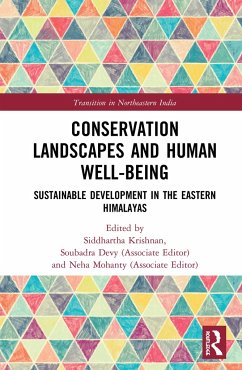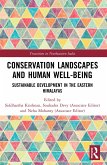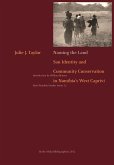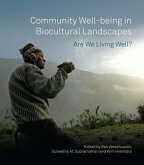Conservation Landscapes and Human Well-Being
Sustainable Development in the Eastern Himalayas
Herausgeber: Krishnan, Siddhartha; Mohanty (Associate Editor), Neha; Devy (Associate Editor), Soubadra
Conservation Landscapes and Human Well-Being
Sustainable Development in the Eastern Himalayas
Herausgeber: Krishnan, Siddhartha; Mohanty (Associate Editor), Neha; Devy (Associate Editor), Soubadra
- Gebundenes Buch
- Merkliste
- Auf die Merkliste
- Bewerten Bewerten
- Teilen
- Produkt teilen
- Produkterinnerung
- Produkterinnerung
This book studies the well-being of the eastern Himalayan forest-dwellers in terms of their capabilities and functioning. It examines the educational and health opportunities afforded to farmers living and working in the Protected Areas of North Bengal, India.
Andere Kunden interessierten sich auch für
![Conservation Landscapes and Human Well-Being Conservation Landscapes and Human Well-Being]() Conservation Landscapes and Human Well-Being66,99 €
Conservation Landscapes and Human Well-Being66,99 €![Indigenous Health and Well-Being in the COVID-19 Pandemic Indigenous Health and Well-Being in the COVID-19 Pandemic]() Indigenous Health and Well-Being in the COVID-19 Pandemic66,99 €
Indigenous Health and Well-Being in the COVID-19 Pandemic66,99 €![Indigenous Health and Well-Being in the COVID-19 Pandemic Indigenous Health and Well-Being in the COVID-19 Pandemic]() Indigenous Health and Well-Being in the COVID-19 Pandemic205,99 €
Indigenous Health and Well-Being in the COVID-19 Pandemic205,99 €![A Universal Declaration of Human Well-being A Universal Declaration of Human Well-being]() Annie AustinA Universal Declaration of Human Well-being41,99 €
Annie AustinA Universal Declaration of Human Well-being41,99 €![Naming the Land. San Identity and Community Conservation in Namibia's West Caprivi Naming the Land. San Identity and Community Conservation in Namibia's West Caprivi]() Julie J. TaylorNaming the Land. San Identity and Community Conservation in Namibia's West Caprivi57,99 €
Julie J. TaylorNaming the Land. San Identity and Community Conservation in Namibia's West Caprivi57,99 €![Human Rights and Human Well-Being Human Rights and Human Well-Being]() William J. TalbottHuman Rights and Human Well-Being44,99 €
William J. TalbottHuman Rights and Human Well-Being44,99 €![Community Well-Being in Biocultural Landscapes: Are We Living Well? Community Well-Being in Biocultural Landscapes: Are We Living Well?]() Community Well-Being in Biocultural Landscapes: Are We Living Well?95,99 €
Community Well-Being in Biocultural Landscapes: Are We Living Well?95,99 €-
-
-
This book studies the well-being of the eastern Himalayan forest-dwellers in terms of their capabilities and functioning. It examines the educational and health opportunities afforded to farmers living and working in the Protected Areas of North Bengal, India.
Hinweis: Dieser Artikel kann nur an eine deutsche Lieferadresse ausgeliefert werden.
Hinweis: Dieser Artikel kann nur an eine deutsche Lieferadresse ausgeliefert werden.
Produktdetails
- Produktdetails
- Verlag: Routledge India
- Seitenzahl: 162
- Erscheinungstermin: 21. Juli 2020
- Englisch
- Abmessung: 240mm x 161mm x 14mm
- Gewicht: 414g
- ISBN-13: 9781138313972
- ISBN-10: 1138313971
- Artikelnr.: 59927391
- Herstellerkennzeichnung
- Libri GmbH
- Europaallee 1
- 36244 Bad Hersfeld
- gpsr@libri.de
- Verlag: Routledge India
- Seitenzahl: 162
- Erscheinungstermin: 21. Juli 2020
- Englisch
- Abmessung: 240mm x 161mm x 14mm
- Gewicht: 414g
- ISBN-13: 9781138313972
- ISBN-10: 1138313971
- Artikelnr.: 59927391
- Herstellerkennzeichnung
- Libri GmbH
- Europaallee 1
- 36244 Bad Hersfeld
- gpsr@libri.de
Siddhartha Krishnan is Associate Professor at Ashoka Trust for Research in Ecology and the Environment (ATREE), Karnataka, India, and is affiliated to its Centre for Biodiversity and Conservation. He is the Convener of ATREE's Academy for Conservation Science and Sustainability Studies. His disciplinary and conceptual interests are in historicizing environmental sociology and sociologizing environmental history. He collects field and archival data to address questions pertaining to pastoral landscape and lifestyle transformations; human capabilities and ecosystems services; environmental justice; and modernity and development questions as they pertain to food, pesticide use and human health. He teaches sociology, environmental sociology and qualitative research methods in ATREE's PhD programme. He was Carson Fellow (2012-2013) at the Rachel Carson Center (RCC) for Environment and Society, Ludwig-Maximilians University, Munich, Germany. Since April 2015, he is member of the Executive Committee of the Carson Society of Fellows. He was elected in April 2016 as a Board member of the International Consortium of Environmental History Organizations. Soubadra Devy is Associate Professor and Co-Convener of the Centre for Biodiversity and Conservation at Ashoka Trust for Research in Ecology and the Environment (ATREE), Karnataka, India. Her research interests are in interactions between plants and animals, and developing a canopy programme for India through its protected areas network. She is also working on extending through participatory community approaches, the biodiversity frontier to production landscapes. In 2006, for her treetop discoveries, she won the Lowell Thomas prize awarded by the Explorers Club and Rolex, USA. She also develops rigorous field conservation courses, which cater to various target audiences. Neha Mohanty presently works as Education and Communication Officer at the Academy for Conservation and Sustainability Studies, ATREE, Karnataka, India. Her areas of interest comprise issues of violence and dispossession, local health traditions, sociology of agriculture and eco-social justice. She is also interested in exploring the impact on mental health of communities in stressful conservation contexts.
1. Human Well-being in Conservation Landscapes 2. Sustainable Development
as Freedom 3. Justice and the Jungle: Contextualizing the Central
Capabilities in Singalila and Senchal Landscapes 4. Sustainable Ecological
Capacity of Forest-Fringe Families 5. Our 'Other Species' Capabilities and
Capabilities of Other Species 6. Our Village Would Have Been Heaven: What
the Families of Gorkhey Value 7. Conclusion: Inclusion
as Freedom 3. Justice and the Jungle: Contextualizing the Central
Capabilities in Singalila and Senchal Landscapes 4. Sustainable Ecological
Capacity of Forest-Fringe Families 5. Our 'Other Species' Capabilities and
Capabilities of Other Species 6. Our Village Would Have Been Heaven: What
the Families of Gorkhey Value 7. Conclusion: Inclusion
1. Human Well-being in Conservation Landscapes 2. Sustainable Development
as Freedom 3. Justice and the Jungle: Contextualizing the Central
Capabilities in Singalila and Senchal Landscapes 4. Sustainable Ecological
Capacity of Forest-Fringe Families 5. Our 'Other Species' Capabilities and
Capabilities of Other Species 6. Our Village Would Have Been Heaven: What
the Families of Gorkhey Value 7. Conclusion: Inclusion
as Freedom 3. Justice and the Jungle: Contextualizing the Central
Capabilities in Singalila and Senchal Landscapes 4. Sustainable Ecological
Capacity of Forest-Fringe Families 5. Our 'Other Species' Capabilities and
Capabilities of Other Species 6. Our Village Would Have Been Heaven: What
the Families of Gorkhey Value 7. Conclusion: Inclusion








